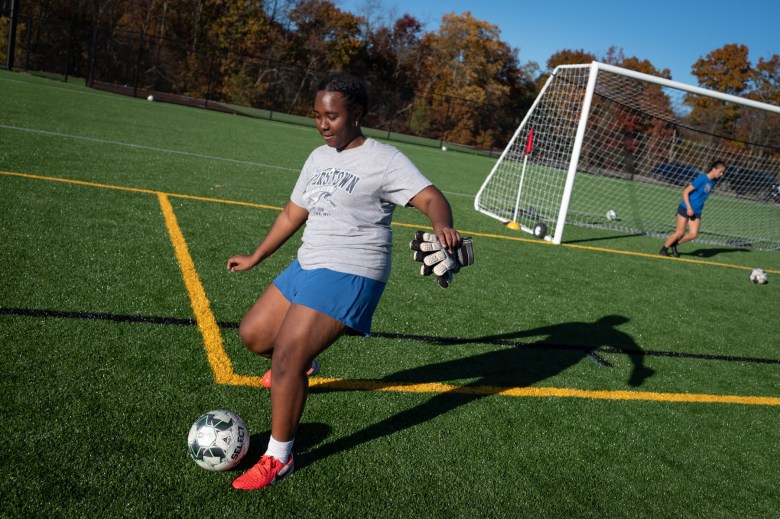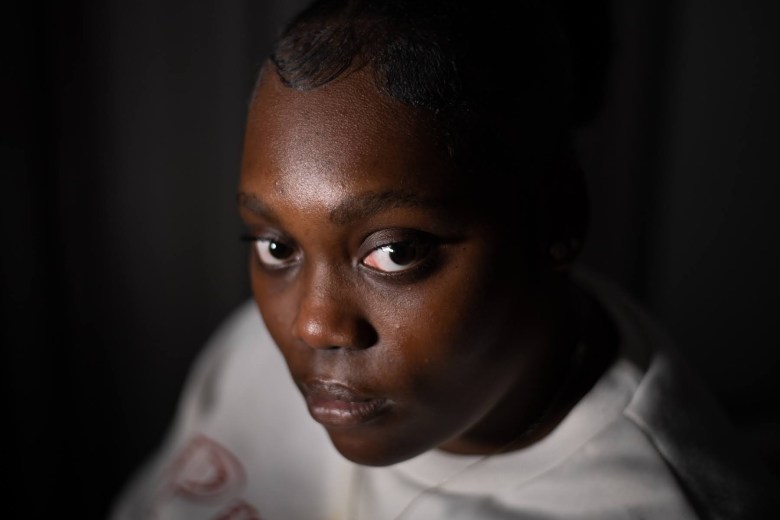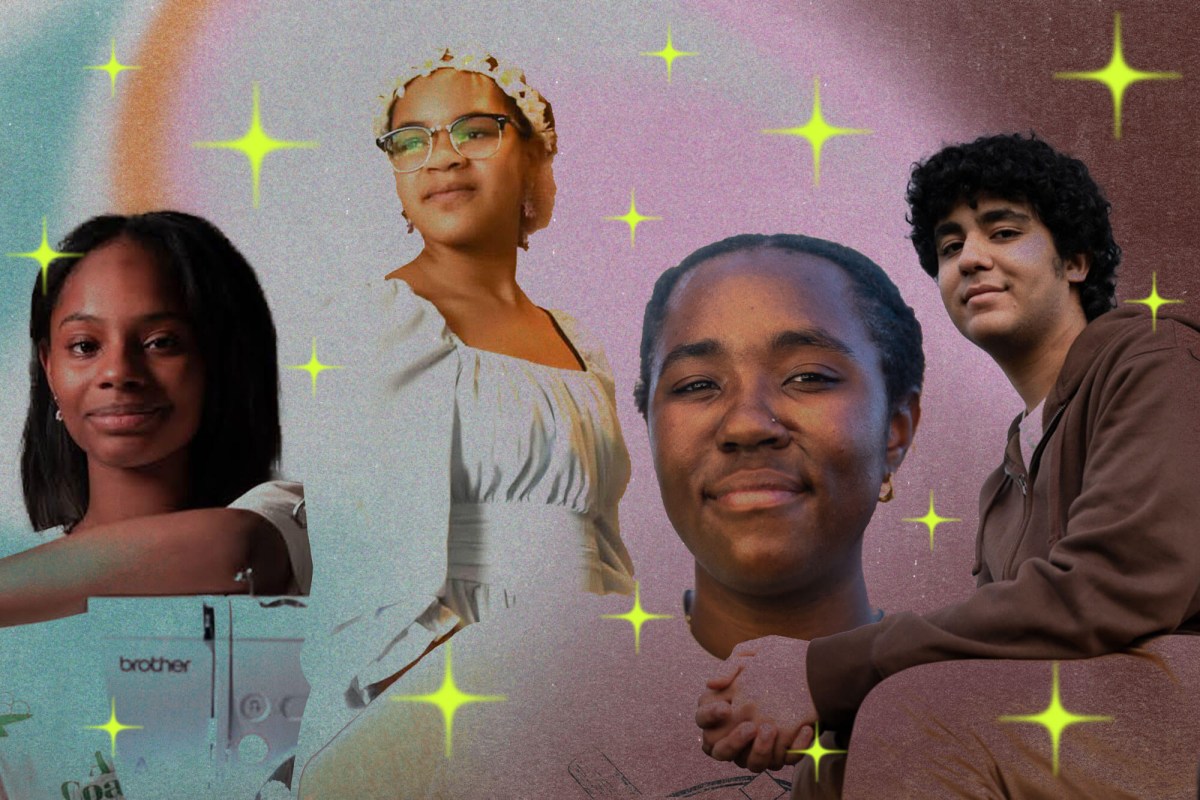Relive the voices of the future in the season finale of From the Source! Our Pittsburgh-area teen co-hosts have shared their perspectives on mental health, activism, immigration and more with humor and bravery throughout the season. With their unique and honest perspectives, our teen guests have left us with hope for the next generation. Tune in to the final episode of From the Source’s fourth season to hear the teens speak their truth.
TRANSCRIPT
Jourdan: Welcome to the season finale of From the Source Podcast. Over the past few months, we’ve had the pleasure of hosting 11 insightful conversations with Pittsburgh-area teens. They’ve shared their perspectives on the issues that are shaping youth culture today, from mental health and immigration to activism and environmental justice. They’ve opened up about the challenges they face in their daily lives, the hopes they have for the future. Through their stories, we’ve gained a deeper understanding of the inner emotional life of teens and the potential they have to make a positive impact on the world.
In this final episode of Season Four, we revisit some of the key themes and ideas that emerged throughout the season. One common thread from these conversations is the importance of having confidence and a sense of purpose. One of the most powerful stories we’ve heard this season came from Jaia, one of the honorees of the Do the Write Thing writing contest. Through her essay, Jaia was able to start processing the trauma she and her cousins had experienced when they witnessed the shooting at the Haunted Hills Hayride in September. 2021. Tragically, a 15-year-old boy lost his life in a shooting.
Jaia: Hello. My name is Jaia Harrison. I live at Avalon. I am 14 years old and I go to Northgate High School and I’m a freshman.
Jourdan: While speaking with us, Jaia didn’t want to revisit the experience of talking to the police, but she did share that it was a turning point for her. It was a light switch moment, as she put it, that woke her up to the urgent need to address teen gun violence.
Jaia: So as I’m writing this essay, I’m really like thinking to myself, I don’t want to go through this again. I don’t want to have to see my little cousins go through this again. I don’t want to have to see somebody’s mother go through this again, you know? So really, I think that’s where my light switch came from, because it’s always there. But I didn’t realize it was there. You know, the Do the Write Thing essay and whole entire experience really helped me flip my switch to want to be an advocate, to stop youth violence.

Jourdan: Cayah Leavy, in episode two, says her parents show they care for her by checking in with her about her mental health.
Cayah: I think I’m able to say things to my parents and they understand. Do they put words into my mouth sometimes? Do they think they know how I feel sometimes? Sure. And is it always right? It’s almost 95% of the time wrong. Which is okay. They care.
Jourdan: Mm hmm.
Cayah: That’s important to me. I think they just don’t overreact about it. They don’t act like this is so crazy. They don’t get flustered by what I’m saying. You know, they don’t make me feel like what I’m saying is crazy. I think that’s what makes me feel okay.
Jourdan: Senior Amaya Dorman spoke to us about how teens use social media and how it affects them and how Amaya’s personally using her social media as a vision board for the life of her dreams.
Amaya: So my name is Amaya Dorman. I live in Swisshelm Park, which is like the Swissvale/Edgewood area. I’m 17 years old. I go to Allderdice High School.
Jourdan: How did you come to decide that this is something that you wanted to speak about for our season of teen voices, issues and things shaping teens impacting teen culture?
Amaya: Like, initially I was like, this is really interesting to me because like, social media affects like a lot of different aspects of our lives. So you have to talk about like, you know, how is all of this at your consuming, how does that affect you as a person? It’s like, you know, I want to live that life, like they seem happy. I want to be happy. But you’re only getting small bursts of videos or you’re only getting a picture and like, that’s happiness for them. But we also have to think about like, what’s happiness for us? Like, as our own people, social media creates a really, like, unrealistic high expectation of how you should be enjoying your life. When you see everybody like going to Dubai for their birthday.
TikTok video: Me and my girl, we are in Dubai
Amaya: I’m not in Dubai, I can afford to go to Dubai. Unfortunately, like working 9 to 5, like working 9 to 5 at a regular building, you can’t really afford to go to Dubai. I feel like it’s kind of hard to have accountability in the sense of like, social media reflects the standards that we have. And then, like as a society, we reflect social media. So it’s like one big, like reflective mirror, which kind of sucks because like, well, who do you hold accountable if everybody is like bouncing back and forth between like where they’re getting their ideas from? So I think that’s kind of hard.
Jourdan: Sam spoke about the standards he was being asked to reflect to his parents.
Sam: My name is Sam Alawadhi. I am a senior at Allderdice High School. Shout out Allderdice, you know. I am Arab. I identify as Muslim, though I’m not the most religious. I am an immigrant, a first-generation immigrant. I am French born, but technically from Yemen. I am a student. Education is so like, important in my life because if I complete the college degree and get this job that I’ve always dreamed of and my parents have always dreamed of, it’s like they succeeded. Like their life is now complete. Like, that’s what they tell me all the time. It’s like what they say. They’re like, it’s like it’s worth it that they came here and the amount of things that they risked and the amount of things that they sacrificed for me to come here and I do what I set out to do. I feel like that’s why they make it so important. They’re like, we want to make this worth it for us and for you. I always wonder, I’m like, if I wasn’t like that, if I wasn’t very college driven, like I didn’t want to go to college, I wanted to do like, trade school or like some gap year or something like that. If I wasn’t that by myself, like, what would my parents think? And I don’t know what they would think now because I’m like, even if they didn’t tell me do it, if they said, do whatever the hell you wanted to do since we came here, we don’t care what you do, I think I’d still be the same person that I am today. Like academic-wise.
Jourdan: Teen entrepreneur and speaker Jazmiere Bates emphasized the importance of adults taking teens and their ideas seriously.
Jazmiere: Hi, everybody. My name is Jazmiere Bates. I’m originally from the Hill District, but I live in Verona now. I am 16. I go to Winchester Thurston, and I am a Virgo. So I had a good opportunity with Ms. Tammy Thompson. I love her so much. It was when she was coming up with the Gallery on Penn. If you never heard of it, it was a storefront with like multiple different spots to give other small businesses ind Pittsburgh a chance to, like, expand their business. There’s a couple other people, and I actually had to pitch my idea to them. So me and my mom, we like went to the Dollar Store. We got like this poster, a poster so I can do my vision board. And at the time I think I was like eight. I was either eight or like 10 or something, and I didn’t know what a pitch was. So I was like, okay, I’m just going to like, talk about it. And I wasn’t even nervous. I remember because like now when I do pitch competitions, I get nervous because it’s like there’s money involved, there’s judges, there’s like a bunch of people interested in the business and stuff like that. So I was just like telling them about it. You just seen hand nods and stuff like that. And then it was like, okay, you’re in. Like, that’s how it was. I’m like, Okay.
Jourdan: Were you surprised?
Jazmiere: I wasn’t surprised. I was just like, I didn’t know it could be that easy. I always took myself seriously. It was just a lot of people, like, don’t have, like, respect for me because of my age. I think it’s because some like, adults can relate, like when they were like kids themselves, like they didn’t take their self seriously a lot of times. They think, oh, since I’m not taking since I wasn’t taking myself serious back then, I don’t think this person’s taking theirself serious right now. But it’s like, come on now. I’m 16. Like c’mon
Jourdan: Grace Glowczewski says her activism comes directly from the love and respect her parents taught her to have for all living things.
Grace: I’m Grace. I go to CAPA and I’m a senior. I definitely got into environmental justice because of my parents, especially my mom. Like I’ve always been vegetarian because not only because I’m sad about animals, but because it’s so bad for the environment. So, like, every decision that my mom has made has been so conscious and good about being environmentalists on all fronts, like the personal front and the like, the lobbying front, everything about that. And also Girl Scouts. Like we’ve been just taught to love our Earth so much, like we go on hikes and and like that has just been so ingrained into my childhood and like, who I am, like the Earth means a lot to me on a personal level. So that means like I will go to lengths to protect it. Like as youth, this is a particularly important issue because we are the most affected by it, but we have the least say in it. Like we are not able to go into Congress and make laws. We are not able to vote, most of us. We’re not able to buy our own groceries and make sure we’re getting organic foods. We’re not able to put solar panels on our roofs. Like we are only able to have conversations and educate ourselves. And I feel like as we get older, it’s our responsibility to educate younger people.
Jourdan: In that same episode, we learned the issues that teens feel their generation is inheriting and how they encourage theirr peers to get involved and change societal issues.
Grace: Like as a Girl Scout troop, basically, we decided that we felt uncomfortable selling Girl Scout cookies because they had palm oil in them that were from like an unsustainable source. And palm oil is a huge reason why deforestation happens in the Amazon. And we were originally concerned about orangutan lives, but not only orangutans are being affected by it, so it seems like a huge issue. Like we went to Girl Scouts and we were like, this is something we are not comfortable supporting, but instead of just deciding not to sell, that would make a very small impact. But we went to Girl Scouts and we were like, this is the problem. Like this is the solution and like we want to see change. And although nothing has actually happened yet, there are still people, like we mobilized Girl Scouts around the country and kind of got the issue out there, proposed a solution. So we create, we’re creating like sustainable change.

Jourdan: Tierra Bush was using her voice on the Black Eyed Peas in a Pod podcast to create a long-lasting effect on how girls her age and younger are educated on how to protect and take care of themselves.
Tierra: I’m Tierra Bush. I’m 17 years old, 17 years old. I’m a senior at Woodland Hills High School and I live in the area of Wilkins Township slash Eastmont. Because I’ve always wanted to be, not always, but since like freshman year, I’ve always wanted to become a gynecologist, OB-GYN. And as getting older and having these conversations about sexual assault and sexual responsibility, it’s opened my eyes to why things have let slide. And it just, it just made me look at just a lot of different things. It just maybe like show how like uneducated I was, like super uneducated I was about my whole body and just like, I’m not going as I. Like hearing it, like when I relive it is like, oh my goodness. Like, wow. Like Tierra, We had no clue. And so it really just I just really kept pushing the idea of me becoming an obstetrician and gynecologist, and just advocating and not just advocating, but educating young women like me and young girls and like, not just only just like being in a delivery room or just being in an office, but being in clinics and saying, hey, or even being in rooms like this, and saying, like this is not okay.
Jourdan: Our co-hosts reminded us that teens have the capacity for incredible creativity, empathy and resilience. They’ve challenged us to see them as individuals with unique voices and experiences and to support them in pursuing their dreams and ambitions. Thanks again for listening to Season Four of From the Source podcast. If you’ve missed any of our conversations with teens, you can find all episodes on our website, Publicsource.org or on Kidsburgh.org and on most podcasting platforms. We return in the fall for Season Five. Season Four of From the Source podcast is produced, reported and hosted by me, Jourdan Hicks. Halle Stockton is our editor in chief. Sound Design and Mixing done by Liz Reid of Jeweltone Productions. PublicSource is an independent, nonprofit newsroom in Pittsburgh, Pennsylvania. You can find all of our reporting and storytelling at Publicsource.org. I’m Jourdan Hicks. Stay safe. Be well.






